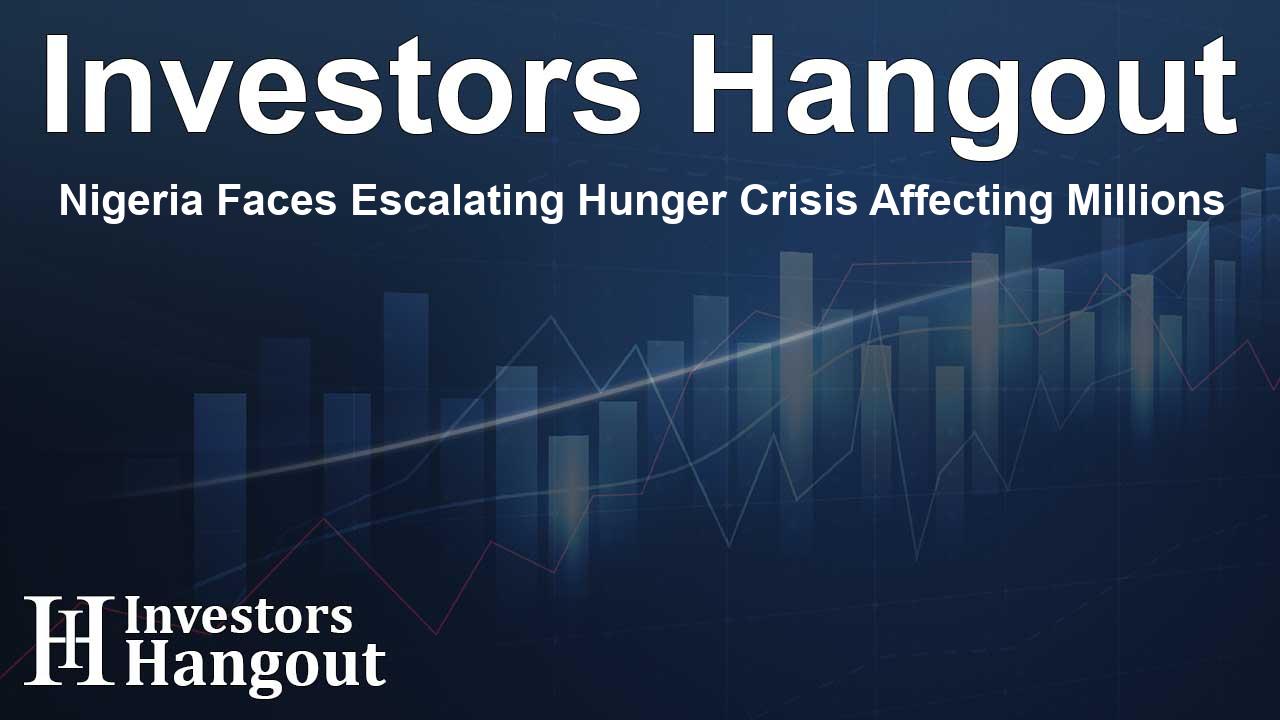Nigeria Faces Escalating Hunger Crisis Affecting Millions

Nigeria Faces a Dire Hunger Crisis
Recent reports indicate that Nigeria is encountering one of its most severe hunger crises yet, with expectations that over 30 million individuals will be food insecure in the coming year. This figure represents a startling one-third increase from the present year. The alarming situation is detailed in a comprehensive study conducted collaboratively by the Nigerian government and the United Nations.
Economic Hardships and Rising Costs
Nigeria, recognized as Africa's most populous nation, is struggling with a significant cost of living crisis that provoked violent protests recently. Economic challenges have intensified following the introduction of austerity reforms by President Bola Tinubu. These reforms included the devaluation of the naira and the removal of a long-standing petrol subsidy, which have together accelerated inflation rates.
The biannual analysis, which evaluates conditions in 26 states plus the federal capital, projected 33.1 million citizens will face food insecurity by August next year, starkly contrasted by the previous estimate of 24.8 million by the year's end.
Driving Forces Behind Food Insecurity
Multiple factors contribute to Nigeria's growing hunger crisis. Notably, the combination of economic strain, soaring inflation, escalating food prices, and increasing transportation costs are pivotal in this dramatic shift. A spokesperson from the World Food Programme, Chi Lael, emphasized that the economic measures intended to stabilize the nation in the long run feel like immediate burdens on citizens, particularly whenever they attempt to purchase food.
Government Assistance Programs
To mitigate the impact on vulnerable families, Finance Minister Wale Edun announced that around 5 million households have received cash distributions of 25,000 naira (approximately $15.45). This assistance is part of the government's broader initiative to alleviate the challenges faced by the most impacted households.
Inflation and Agricultural Challenges
The increasing food prices have been a significant factor in soaring inflation rates, with September seeing an annual inflation level hitting 32.70%, up from 32.15% in August. Moreover, ongoing issues like flooding and insecurity in northern regions continue to disrupt agricultural activities, exacerbating the situation and causing prices to surge beyond the financial reach of many households.
Impact of Recent Flooding on Agriculture
Recent floods have wreaked havoc on agricultural regions, damaging approximately 1.6 million hectares of crops in critical northern states, which are crucial for the nation’s food supply. The potential losses from these floods could reach up to 1.1 million tonnes of staple crops, including maize, sorghum, and rice. This significant loss is sufficient to fulfill the daily food requirements for about 13 million individuals for an entire year.
Economic Cost of the Crisis
The financial implications of these agricultural losses are staggering, approximating nearly $1 billion in economic damages. The continuous cycle of increase in food prices, coupled with economic hardships, puts many families at risk, significantly affecting their ability to secure essential food items.
Frequently Asked Questions
What is the current food insecurity rate in Nigeria?
According to recent reports, over 30 million people in Nigeria are expected to face food insecurity next year, a significant increase from this year.
What economic reforms have impacted Nigeria's food situation?
President Bola Tinubu's austerity reforms, including naira devaluation and removal of petrol subsidies, have adversely contributed to rising food prices and inflation.
How much have recent floods affected agriculture in Nigeria?
Recent floods destroyed an estimated 1.6 million hectares of crops, potentially resulting in losses of around 1.1 million tonnes, greatly impacting food availability.
Is the Nigerian government taking any measures to help affected families?
Yes, the Nigerian government has initiated cash assistance programs, distributing 25,000 naira to vulnerable households as a relief measure.
What is the inflation rate regarding food prices in Nigeria?
As of September, Nigeria's inflation rate reached 32.70%, driven primarily by rising food prices, which dramatically affects access to essentials.
About Investors Hangout
Investors Hangout is a leading online stock forum for financial discussion and learning, offering a wide range of free tools and resources. It draws in traders of all levels, who exchange market knowledge, investigate trading tactics, and keep an eye on industry developments in real time. Featuring financial articles, stock message boards, quotes, charts, company profiles, and live news updates. Through cooperative learning and a wealth of informational resources, it helps users from novices creating their first portfolios to experts honing their techniques. Join Investors Hangout today: https://investorshangout.com/
Disclaimer: The content of this article is solely for general informational purposes only; it does not represent legal, financial, or investment advice. Investors Hangout does not offer financial advice; the author is not a licensed financial advisor. Consult a qualified advisor before making any financial or investment decisions based on this article. The author's interpretation of publicly available data shapes the opinions presented here; as a result, they should not be taken as advice to purchase, sell, or hold any securities mentioned or any other investments. The author does not guarantee the accuracy, completeness, or timeliness of any material, providing it "as is." Information and market conditions may change; past performance is not indicative of future outcomes. If any of the material offered here is inaccurate, please contact us for corrections.









